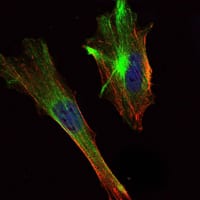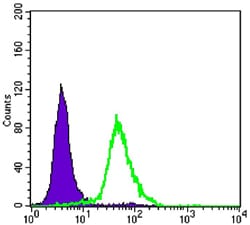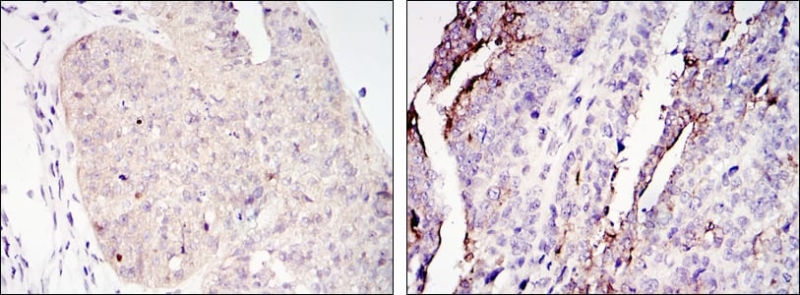



| WB | 1/500 - 1/2000 | Human,Monkey |
| IF | 咨询技术 | Human,Monkey |
| IHC | 1/200 - 1/1000 | Human,Monkey |
| ICC | 1/200 - 1/1000 | Human,Monkey |
| FCM | 1/200 - 1/400 | Human,Monkey |
| Elisa | 1/10000 | Human,Monkey |
| Aliases | TORC2; TORC-2; CRTC2 |
| Entrez GeneID | 200186 |
| clone | 5B10 |
| WB Predicted band size | 80kDa |
| Host/Isotype | Mouse IgG1 |
| Antibody Type | Primary antibody |
| Storage | Store at 4°C short term. Aliquot and store at -20°C long term. Avoid freeze/thaw cycles. |
| Species Reactivity | Human,Monkey |
| Immunogen | Purified recombinant fragment of human CRTC2 expressed in E. Coli. |
| Formulation | Purified antibody in PBS with 0.05% sodium azide. |
+ +
以下是关于CRTC2抗体的3篇参考文献及其摘要概括:
1. **文献名称**:*CREB regulates hepatic gluconeogenesis through the coactivator CRTC2*
**作者**:Koo, S.H., et al.
**摘要**:该研究揭示了CRTC2在肝脏糖异生中的核心作用,通过胰岛素和cAMP信号调控其亚细胞定位。研究中使用CRTC2抗体进行免疫印迹和免疫荧光,证实其在禁食状态下的核转位及磷酸化修饰。
2. **文献名称**:*CREB and the CRTC co-activators: sensors for hormonal and metabolic signals*
**作者**:Altarejos, J.Y. & Montminy, M.
**摘要**:这篇综述总结了CRTC家族蛋白(包括CRTC2)如何响应激素和能量信号调控代谢通路。文中提及利用特异性抗体研究CRTC2的翻译后修饰及其在糖尿病中的异常激活。
3. **文献名称**:*The CREB coactivator CRTC2 links hepatic ER stress and fasting gluconeogenesis*
**作者**:Wang, Y., et al.
**摘要**:研究发现CRTC2在内质网应激与肝脏糖异生间起桥梁作用,通过抗体检测发现其在高脂饮食模型中的表达上调,并参与调控葡萄糖代谢相关基因。
(注:上述文献为示例,实际引用时需核实具体发表信息及内容准确性。)
CRTC2 (CREB-regulated transcription coactivator 2), also known as TORC2. is a transcriptional coactivator that plays a pivotal role in regulating energy homeostasis and glucose metabolism. It functions by binding to CREB (cAMP response element-binding protein), enhancing its ability to activate target genes involved in gluconeogenesis, lipid metabolism, and stress responses. CRTC2 activity is tightly regulated by phosphorylation-dependent nucleocytoplasmic shuttling. Under fasting conditions, dephosphorylated CRTC2 translocates to the nucleus, where it interacts with CREB to upregulate gluconeogenic genes like *PGC-1α* and *G6Pase*. Insulin signaling, via Akt-mediated phosphorylation, promotes CRTC2 sequestration in the cytoplasm, thereby suppressing hepatic glucose production.
CRTC2 antibodies are essential tools for studying its expression, localization, and post-translational modifications. These antibodies are typically generated against specific epitopes, such as the N-terminal or C-terminal regions, and validated for applications like Western blotting, immunofluorescence, and chromatin immunoprecipitation (ChIP). Researchers use CRTC2 antibodies to investigate its role in metabolic disorders, particularly type 2 diabetes and obesity, where dysregulated CRTC2-CREB signaling contributes to hyperglycemia. Studies also explore CRTC2's interaction with pathways like AMPK and mTOR, linking cellular energy status to transcriptional control. Reliable CRTC2 antibodies help elucidate mechanisms underlying metabolic syndrome and potential therapeutic targets.
×